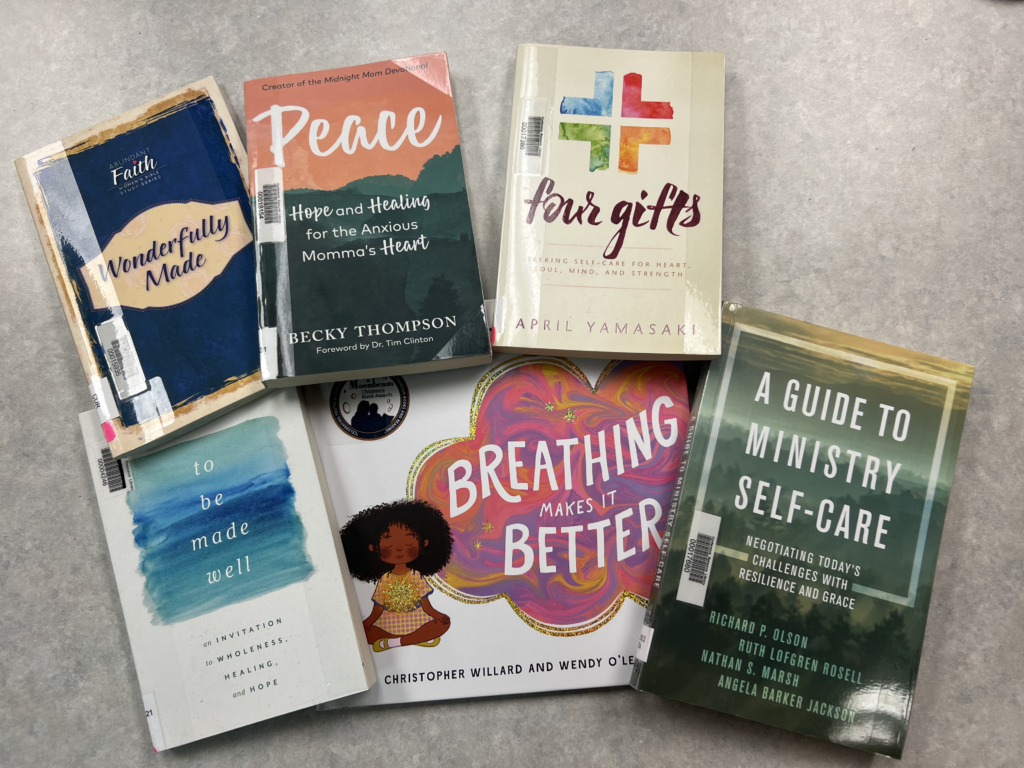This morning, I watched my little one walk up to the front doors of her school all by herself. Her backpack almost hangs to her knees as she bravely enters the world of Kindergarten. For many, August is a time of change, a time of transition. Teachers and other school staff as well as students and their caregivers enter new rhythms and routines. Others look toward cooler days of fall and programming resuming at church such as Wednesday programs, Bible studies, and more. Our lives are full of changes and transitions, at church and at home, vocationally and relationally. What does it mean to care for ourselves in the midst of changes (both the good and the bad?) How can we experience and share God’s healing and hope as we bravely face the future?
A recent Herald Press title (How Can We Be Made Well: An Invitation to Wholeness, Healing, and Hope by Amy Julia Becker) highlights the healing work of Jesus and explores what it means to live lives full of healing. What a beautiful vision–living in wholeness with hope!
One way we can move toward personal, spiritual, and social healing is to practice self-care. According to The Self Care Institute, “self-care means caring for yourself in your various life roles with compassionate action and mentality”. I’ve pulled together a short list of self-care resources that can help you explore what faith-focused self-care might look like in your life.
- To Be Made Well: An Invitation to Wholeness, Healing, and Hope by Amy Julia Becker (also available in the Book Bundles for Group Study Program)
- A Guide to Ministry Self-Care: Negotiating Today’s Challenges with Resilience and Grace by Richard P. Olson and others
- Peace: Hope and Healing for the Anxious Momma’s Heart by Becky Thompson
- Four Gifts: Seeking Self-Care for the Heart, Soul, Mind, and Strength by April Yamasaki
- Wonderfully Made by Terri J. Plank Brenneman (Women’s Bible study)
And especially for children of all ages, we have a variety of resources on feelings, mindfulness and more! One favorite is Breathing Makes it Better: A Book for Sad Days, Mad Days, Glad Days, and all the Feelings In-Between by Chrisopher Willard and Wendy O’Leary. At our house, we talk about Holy Spirit Breaths and how deep mindful breathing helps as we breathe in the Holy Spirit who brings us peace.
When we are at peace, living in wholeness, we are more equipped to offer that same healing and hope to the brokenness around us. We become better friends, healthier helpers, and can more easily love others when we are people who are filled with God’s hope and experience wholeness. May you find a way to care for yourself today as you bravely face something new.
-Jennie Wintermote, WDC Resource Library Director
Dios Nos Invita a la Plenitud
Esta mañana, vi a mi pequeña caminar sola hasta las puertas de entrada de su escuela. Su mochila casi le llega a las rodillas cuando entra valientemente en el mundo del jardín infantil. Para muchos, agosto es una época de cambios, una época de transición. Los maestros y otro personal escolar, así como los estudiantes y sus cuidadores, ingresan a nuevos ritmos y rutinas. Otros miran hacia los días más frescos del otoño y la reanudación de la programación en la iglesia, como los programas de los miércoles, los estudios bíblicos y más. Nuestras vidas están llenas de cambios y transiciones, en la iglesia y en el hogar, vocacional y relacionalmente. ¿Qué significa cuidar de nosotros mismos en medio de los cambios (¿tanto los buenos como los malos?) ¿Cómo podemos experimentar y compartir la sanidad y la esperanza de Dios mientras enfrentamos valientemente el futuro?
Un título reciente de Herald Press (How Can We Be Made Well: An Invitation to Wholeness, Healing, and Hope by Amy Julia Becker) destaca la obra sanadora de Jesús y explora lo que significa vivir vidas llenas de sanidad. ¡Qué hermosa visión: vivir en plenitud con esperanza!
Una forma en que podemos avanzar hacia la curación personal, espiritual y social es practicar el cuidado personal. Según The Self Care Institute, “el cuidado personal significa cuidarse a sí mismo en sus diversos roles de vida con acción y mentalidad compasiva”. He reunido una breve lista de recursos de cuidado personal que pueden ayudarlo a explorar cómo podría ser el cuidado personal centrado en la fe en su vida. (Los siguientes recursos se encuentran solamente en inglés)
- To Be Made Well: An Invitation to Wholeness, Healing, and Hope por Amy Julia Becker (también disponible en los paquetes de libros para el programa de estudio en grupo)
- A Guide to Ministry Self-Care: Negotiating Today’s Challenges with Resilience and Grace por Richard P. Olson y otros
- Peace: Hope and Healing for the Anxious Momma’s Heart por Becky Thompson
- Four Gifts: Seeking Self-Care for the Heart, Soul, Mind, and Strength por April Yamasaki
- Wonderfully Made por Terri J. Plank Brenneman (estudio bíblico para mujeres)
¡Y especialmente para niños de todas las edades, tenemos una variedad de recursos sobre sentimientos, atención plena y más! Uno de los favoritos es Breathing Makes it Better: A Book… [un libro para los días tristes, los días locos, los días alegres y todos los sentimientos intermedios] de Chrisopher Willard y Wendy O’Leary. En nuestra casa, hablamos sobre el Espíritu Santo y cómo la respiración profunda y consciente ayuda a respirar el Espíritu Santo que nos trae paz.
Cuando estamos en paz, viviendo en plenitud, estamos más equipados para ofrecer esa misma sanidad y esperanza al quebrantamiento que nos rodea. Nos convertimos en mejores amigos, ayudantes más sanos y podemos amar más fácilmente a los demás cuando somos personas llenas de la esperanza de Dios y experimentamos la plenitud. Que encuentre una manera de cuidarse a si mismo hoy mientras se enfrenta valientemente a algo nuevo.
-Jennie Wintermote, Director de la Biblioteca de Recursos de WDC
